-
 Art of Wellness Acupuncture & Traditional Chinese Medicine (TCM)11704 Wilshire Blvd, Suite 295, Los Angeles, CA, 90025
Art of Wellness Acupuncture & Traditional Chinese Medicine (TCM)11704 Wilshire Blvd, Suite 295, Los Angeles, CA, 90025
myartofwellness@gmail.com310-451-5522 Office Hours
MonClosedTue7:30 am --4 pmWed7:30 am --4 pmThu7:30 am -- 4 pmFri7:30 am -- 4 pmSat7:30 am -- 4 pmSunClosedOur office opens from Tuesdays to Saturdays 7:30 am to 4 pm, will be closed on Memorial day, Independent day, Labor day, Thanksgiving day, Christmas and New year.
-
Recent Posts
- How to Treat MCAS With Acupuncture and TCM
- How to Treat Shin Splints With Acupuncture and TCM
- How to Treat Dysautonomia With Acupuncture and TCM
- How to Treat Myofascial Pain Syndrome With Acupuncture and TCM
- How to Treat Costochondritis With Acupuncture and TCM
- How to Treat Ankylosing Spondylitis With Acupuncture and TCM
- How to Treat Gastroparesis With Acupuncture and TCM
- How To Treat Sleep Apnea With Acupuncture and TCM
- How To Treat Baker’s Cyst With Acupuncture and TCM
- How to Treat Sinusitis With Acupuncture and TCM
- How To Treat Sjogren’s Disease With Acupuncture and TCM
- How to Treat Raynaud’s Syndrome With Acupuncture and TCM
- Sign up to receive news and updates and get my free report:“The Top 10 Reasons to Try Acupuncture”

Herbal Medicine
How to Treat Bloated Stomach With Acupuncture and TCM
By Xiaomei Cai, L.Ac,. Ph.D. & Qineng Tan, L.Ac., Ph.D.
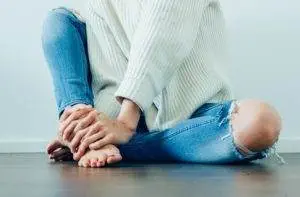
Do you feel constantly gassy or have a bloated stomach after eating? Digestive problems like gastritis or colitis can cause abdominal bloat. Stress and hormonal imbalances can also contribute to inflammation and bloated stomach pain. Acupuncture and TCM herbs can help improve digestion and relieve abdominal bloating.
Abdominal bloating occurs when gas builds up in the gastrointestinal tract, filling the stomach and/or intestines with air. This can cause the belly area to get swollen and distended. Bloating can cause an inflated belly, sharp pain in the abdomen, belching and flatulence, nausea, or a sudden strong urge to go to the bathroom. Bloating can be related to fluid retention; this is sometimes called “water bloat.”
Problems with digestion that lead to a feeling of heaviness, “like a rock” in your belly after eating, are common. People who have been diagnosed with some type of functional gastro-intestinal disorder (FGID)–like irritable bowel syndrome (IBS) or dyspepsia (indigestion)–are extremely likely to experience abdominal pain and bloating after eating, while up to 30% of all people report having bloating at least some of the time. Inflammation in the walls of the stomach (gastritis) or intestine (ulcerative colitis) can also cause bloating.
Women often feel bloated before or during their menstrual period, and female reproductive disorders like endometriosis, fibroids (leiomyoma of the uterus), and PCOS (polycystic ovarian syndrome) can cause abdominal pain and bloating.
FGIDs can be very hard to manage; it may be difficult to get a clear diagnosis or effective medical treatment. Problems like constipation, diarrhea, nausea, abdominal pain and bloating are highly subjective, and people are often made to feel like it’s normal to have these issues, or that all they need to do is avoid certain foods.
Feelings of anxiety and depression are common among people who suffer from moderate to severe bloating on a regular basis. This can become a vicious cycle, as the pain and swelling of the abdomen causes anxiety, and the physiological effects of the emotional stress trigger the bloating to happen again and again. Sometimes people dread eating meals because they are so afraid of the painful and embarrassing bloated stomach.
Digestive upsets are complex to treat because there can be many factors contributing to the discomfort. So many different conditions can cause bloating, it can be hard to get a clear handle on the true cause. This is a case when TCM methods of diagnosis offer many advantages, because a TCM practitioner will be able to study the whole picture presented by a patient and pinpoint what underlying conditions are causing gas and distension. Acupuncture and herbs can help resolve abdominal bloating and other symptoms at their root source.
Top 10 Abdominal Bloating Causes

Why might someone feel bloated and gassy all the time? Many different types of gastrointestinal disorders can contribute to a bloated belly and excess gas, as can hormonal and emotional changes. What causes abdominal bloating can be one issue or a combination of factors:
- Irritable Bowel Syndrome (IBS)
- Inflammatory bowel disease, Ulcerative colitis or Crohn’s Disease
- Gastritis, stomach ulcers, inflammation of the stomach
- Food intolerance, gluten intolerance, celiac disease
- PMS, menstruation
- Stress, anxiety, depression
- Pregnancy
- Constipation
- Liver disease
- Abdominal adhesions, or scar tissue from surgeries
Eating behaviors like eating too quickly, swallowing air while eating, or eating fiber-rich foods that cause gas like beans, can lead to bloating. Drinking a lot of carbonated beverages can lead to excess gas in the GI tract. Smoking can also be a factor. Some medications can cause bloating as a side effect, including antibiotics, oral birth control pills, opioid pain medications, medicines to relieve constipation, and even some supplements, like iron pills.
Cancers of the abdominal organs, such as ovarian cancer, stomach cancer, colon cancer, or pancreatic cancer, can also cause bloating in the belly. Gallstones or gallbladder disease, gastroparesis, kidney problems, and liver problems can all cause stomach pain and bloating.
Medical Treatment for Abdominal Bloating
Many people do not seek medical help for bloating, trying to manage it on their own with over the counter medications that promise relief from gas pain and acid reflux. Antacids only help with the kind of bloating that is caused by food, though; they don’t help with bloating related to FGIDs, hormones, or emotional stress. When a person does ask their primary care doctor or even a gastroenterologist for help with bloating, they may find that the treatment options are very limited. Doctors will usually reassure patients that gas and bloating, while uncomfortable, are not actually dangerous. Then, they will often advise that patients go on a strict elimination diet, cutting out wheat, dairy, and most vegetables and legumes. Sometimes doctors will prescribe antibiotics to alter the balance of gut bacteria. Antidepressants are sometimes prescribed to help with bloating. Conventional medical science still has a ways to go to fully understand the underlying causes of digestive problems like bloating.
Because bloating is not viewed as a disorder in and of itself, not much serious research has been done to show what types of treatments work best to get rid of bloating. TCM treatment has been shown in a randomized controlled trial, a peer-reviewed study, and a hospital-based investigation to help in relieving stomach pain due to chronic gastritis.
How Can Acupuncture Help With Bloating?
TCM offers a multidisciplinary approach to the digestive problems, hormone imbalances, and emotional upsets that can cause bloating. An experienced acupuncturist is able to use methods of diagnosis such as studying the appearance of the tongue, feeling the pulse, and asking lots of questions about how and when the symptoms occur to find the specific pattern of imbalance that is causing gastric distress.
Different presentations of digestive conditions that may cause abdominal bloating and pain include:
- Spleen/Stomach Deficiency – characterized by symptoms: chronic bloating, poor appetite, feel worse after eating, pallor, and fatigue. This type of bloating can be caused by antibiotics, too much raw or fermented food, eating disorders, a long period of illness, or chronic inflammatory disorders.
- Damp-Phlegm – symptoms include: distended stomach, nausea, acid reflux, diarrhea. This type of bloating can be caused by dietary habits that include excess sugar, alcohol, fatty or fried foods, and dairy products. Can also be related to damp environmental conditions.
- Liver Qi stagnation – common symptoms are: stomachaches, stomach gurgling, belching, and constipation. This type of bloating can be caused by stress, feelings of anxiety or anger, and irregular, emotional eating behaviors.
TCM treatment for abdominal bloating will use acupuncture and herbs to bring the stomach and liver back into harmonious function, clearing phlegm and improving digestion. Treatment will be individualized based on the underlying causes of the imbalance; if reproductive hormones are involved, then that factor will be taken into consideration when preparing the herbal formula. If mental health issues are a factor, specific points will be added to help relieve anxiety. Naturally, your acupuncturist will have some clear instructions on how to optimize your nutrition to reduce bloating.
Top 5 Tips for How to Stop Bloating

While bloating may be caused by all sorts of different factors, there is no doubt that making some changes to your eating habits will probably have an impact on how bloated you feel. What helps bloating may be different for each person’s constitution or lifestyle, so it will be very helpful to have an in-depth conversation with your acupuncture provider about what bloating diet is best for you.
- Chew your food thoroughly. Many people eat fast, and don’t pay much attention to chewing their food well before they swallow. Food is really meant to be broken down and mixed with saliva in the mouth before it moves down the esophagus and into the stomach. Skipping this important step by swallowing half-chewed food means that your stomach has to produce more acid and work much harder to digest the food before it moves deeper into your gastrointestinal tract. Eating too quickly can also easily lead to eating more than you need. It takes about 20 minutes for your brain to receive the message that the stomach is full. Chew slowly, and enjoy every bite; this will improve your digestion.
- Avoid icy cold drinks and foods. Cold liquids are shocking and unfriendly to your internal organs, both those of the digestive tract and the female reproductive organs. Constantly drinking ice-cold beverages irritates the smooth muscle tissues of the stomach, intestines, and uterus. Drink more warm liquids, which are soothing to these organs.
- Ginger tea – many of our herbal formulations include slices of fresh ginger to help soothe the stomach and GI tract. Ginger helps the body to produce more of the digestive enzymes that work to break down food, and relieves cramping in the belly. All you need to do is keep a knob of fresh ginger on hand, cut two or three slices and steep in hot water as you would a teabag. Sip anytime, but especially before meals, to help relieve gastritis pain and bloating.
- Choose foods in harmony with the season. Raw foods are appropriate in the summer, but in the winter, it’s better to eat cooked foods. Eating more bitter-tasting foods, like dark leafy greens, helps the liver and kidneys.
- Use acupressure to help relieve bloating and gassiness. Acupoints are located along the meridians and correspond to various organ systems. Applying gentle, steady, downward pressure to acupoint ST36 (Zu San Li), which is associated with the stomach, can help to relieve bloating, stomach pain, nausea, and feelings of stress. ST36 is located on the outer edge of the shin bone, about 4 finger widths beneath the kneecap.
Acupuncture Near Me for Abdominal Bloating
TCM offers a holistic approach to digestive problems of all kinds. Symptoms like abdominal bloating, stomach pain, and gassiness are usually signs that there is a deeper problem. If you haven’t been able to solve the problem of bloating with conventional medicine or dietary changes, you may be able to get help for digestive difficulties with acupuncture and herbs.
*This article is for education from the perspective of Traditional Chinese Medicine only. The education provided by this article is not approved by FDA to diagnose, prevent, treat and cure human diseases. It should not stop you from consulting with your physician for your medical conditions. Traditional Chinese Medicine is based on Qi, which is an invisible force that usually cannot be observed by modern science. Because science focuses on testing ideas about the natural world with evidence obtained through observation, these aspects of acupuncture can’t be studied by science. Therefore acupuncture and Chinese herbs are often not supported by double-blind, randomized trials, and they are considered alternative medicine therapies in the United States.
How to Treat Candida With Acupuncture and TCM
By Xiaomei Cai, L.Ac., Ph.D., & Qineng Tan, L.Ac., Ph.D.
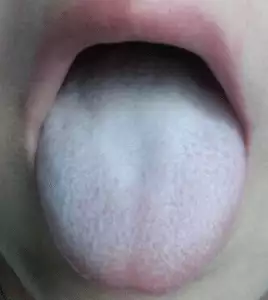
Why do I keep getting yeast infections? White patches on the tongue? It could be the common fungal infection Candida, also known as Candidiasis or a yeast infection. Candida infection can happen to people of all ages and in different parts of the body. Acupuncture and TCM Chinese herbs can help resolve recurrent yeast infections and thrush in the mouth.
Candida albicans, the species of candida fungus that most often causes candidiasis, is a type of yeast that naturally exists in the human body. When the population of candida is kept to normal levels, it causes no harm; in fact, it acts to help digestion and the absorption of nutrients from food. But when proliferation of the fungus gets out of control, candida can cause burning pain, redness and inflammation, and difficulty with normal processes like eating, digestion, and elimination. In extreme cases, candidiasis can cause serious illness.
Candida overgrowth most often happens in the mouth (known as “thrush”), or in the genital area (usually called a “yeast infection”). Thrush in babies’ mouth commonly affects very young infants, creating white or yellow patches or sores in and around the mouth that can affect feeding. Thrush in adults is less common, but can occur when someone’s immune system is weak (common among people living with HIV/AIDS), or if they wear dentures or use medications for dry mouth, causing the typical white patches, cracks in the corners of the lips, and burning sensations in and around the mouth and throat.
Most women have probably experienced a vaginal yeast infection at some point in their lives. This type of candida causes burning and itching in the vulva and vagina along with a white, clumpy discharge. Candidiasis can also affect men, causing an itchy rash on the penis.
Is candida or thrush contagious? It’s rare for a person to “catch” a fungal infection from another person, but it is possible, for example, for a person to pass a yeast infection to his or her partner through sexual contact. It is also possible for a mother to develop thrush on her nipples from nursing her baby who has oral candidiasis.
Candida overgrowth can affect other parts of the body, including the finger or toe nails (candidal paronychia), and especially areas of the skin that tend to be damp and sweaty, like the armpits or the creases around the groin.
In some cases, invasive candidiasis can get deeper into the body, infecting the gastrointestinal system or even getting into the bloodstream, which can lead to infection of various organs, including the eyes, heart or kidneys. This type of candida infection can become serious, causing fever, and even sepsis, which can be fatal.
Candida overgrowth creates different problems for different people. That is why TCM, acupuncture, and herbal medicine provide an excellent way to treat candida. TCM theory of candidiasis treatment allows for a highly individualized approach to each patient, so that we can get rid of yeast infections for good.
Top 5 Types of Candida Infection

Candida overgrowth can occur in different parts of the body. The most common kinds of yeast infection or candida are:
- Oral candidiasis – also known as thrush in mouth, or yeast infection in the mouth. Thrush in babies usually occurs because the infection passes from the mother’s vaginal area to the baby during birth, and the infant’s immune system is not developed enough to fight it. What thrush on tongue looks like: white patches that can be wiped off.
- Vaginal candidiasis – commonly known as a vaginal yeast infection, candidiasis of the female genitals causes redness, burning, and “cottage cheese-like” discharge.
- Candidal balanitis – candida infection of the male genitals happens particularly in uncircumcised men. More recent research has led some medical professionals to believe that fungal infections may cause a prostate problem, infection in prostate, prostatitis symptoms, enlarged prostate symptoms, and symptoms to prostate cancer.
- Cutaneous candidiasis – or yeast infection on skin. Candida can cause diaper rash in babies, and red, itchy, peeling patches in areas where the skin has many folds and creases. Candidiasis can also infect the fingernails, toenails and nail beds.
- Invasive candidiasis – When candida gets into the digestive tract or bloodstream, it can cause a serious systemic infection that affects the blood, heart, brain, esophagus, and/or digestive tract. This happens most often in people with compromised immune systems, especially people with HIV or who are undergoing chemotherapy for cancer.
Candida overgrowth can also lead to symptoms of fatigue, chronic allergies, chronic sinusitis or post-nasal drip. Central nerve damage, constant irritability, and chronic fatigue syndrome are all signs that a person may have a deep candida infection.
What Causes Candida?
Candida yeasts are present in every human body. What causes candidiasis is abnormal fungal overgrowth due to a lack of friendly bacteria or a weakened immune system. Women often get yeast infections during pregnancy because of changes in the balance of bacteria in their pelvic area. Antibiotics, steroids, birth control pills, and chemotherapy drugs can all contribute to candidiasis by affecting the gut flora. Just a few rounds of antibiotics can destroy all of the healthy bacteria we need to maintain proper balance. Personal habits and hygiene mishaps, like wearing too-tight pants or the same sweaty workout clothes all day, can also lead to yeast infections. Food choices can also play an important role in whether or not a person is prone to yeast infections. It may be recommended that people go on a “candida cleanse” or special candida diet to help stop the candida overgrowth.
How Do You Treat Candida?

Often a mild case of candidiasis in the mouth will go away within a few weeks on its own. If oral thrush treatment is needed, a doctor may prescribe antifungal nystatin drops, mouthwash, or lozenges.
Cutaneous candida (skin infection), vaginal yeast infections, and male genital infections will usually be treated with antifungal medications such as Fluconazole, which can be taken orally, or topical antifungal creams like Nystatin.
These antifungals may help to alleviate the symptoms of candidiasis by stopping the yeast overgrowth. However, for many people who experience recurrent yeast infections, they are only a temporary solution. Frequent use can build up an antifungal resistance. When candida keeps coming back, there is surely a deeper cause for the ongoing yeast infections.
Azoles and other types of antifungal medications are used to stop the growth of the candida in patients with invasive candidiasis. Unfortunately, they can also be toxic to other organs, like the kidneys. For people who are already in poor health, these medications may cause more harm.
Acupuncture and TCM provide a method for dealing with candidiasis while improving immune function, and revitalizing the health of the skin, reproductive organs, digestive tract, or whatever parts of the body are affected by candida overgrowth.
How Can Acupuncture Help Candida?
In TCM philosophy, the spleen and stomach play important roles in digestion, especially the transformation of one fluid into another, and the movement of fluids through the digestive and eliminative organs. Basically, in TCM, the spleen is responsible for turning what we eat and drink into healthy blood and Qi (life force energy). When the spleen and stomach are weak and not working well, excess fluid builds up and encourages the candida yeasts to reproduce.
Candida is considered to be caused by spleen/stomach deficiency and dampness. When dampness collects in the pelvic region, it creates phlegm and leads to congestion and heaviness. This is what can lead to vaginal yeast infections or a prostate problem in men.
In other cases, the improper functioning of the stomach causes heat and fire to develop in the upper part of the body, which can cause thrush in the mouth, or the kind of invasive candidiasis that affects the heart.
Your acupuncturist will work to improve spleen and stomach function to restore balance of the intestinal flora with a combination of acupuncture, customized herbs, and a complete nutritional analysis to create an appropriate diet to cleanse candida from the system.
Acupuncture treatment will strengthen and tonify the spleen and other organs. Herbs can be used internally and externally to help relieve candidiasis. TCM formulations that have developed over many centuries are known to have antifungal and antibacterial properties.
Several studies have demonstrated the efficacy of using herbs in external forms for women’s genital infections. Using herbs via steam, hip bath, or douche bypasses the digestive system so that the herbs can directly help to reduce inflammation and discharge.
Top 5 Candida Diet Tips

A TCM practitioner will focus on creating and implementing a food program that helps to clear dampness from the body. Candida infection tends to occur when the body is more acidic. A diet that is high in refined sugars and meats and low in vegetables tends to create a lower PH level (below 7). Eating more dark green leafy vegetables will help to make the body more alkaline. It is also very important to check behavioral habits that might be contributing to the yeast overgrowth.
- Avoid all refined sugars, sweeteners, sweets, and even fruits. These foods all cause the candida yeast to spread more quickly. Stay away from foods with yeasts in them, like bread, crackers, packaged cereals, and pretzels. Vinegar and alcohol should also be cut out of the diet until the situation improves.
- Avoid milk, cheese, eggs, and red meats, and emphasize instead lots of green vegetables. Chlorophyll (the phytonutrient present in all green leaves) is especially helpful for getting rid of candidiasis. Stay away from eating fungi, like mushrooms, and pickled vegetables.
- Eat more warm, cooked foods, especially soups and rice, which are easy to digest. Other helpful foods include orange and yellow winter squashes and daikon radish.
- Use a baking soda solution (1-2% solution) to douche or as a hip bath to help get rid of a vaginal yeast infection.
- Taking a high quality probiotic supplement can help to restore proper balance of the gut flora and control yeast growth.
Be sure to keep the skin in sensitive areas clean and dry, but avoid using harsh soaps or deodorants. Avoid too-hot showers or baths, especially in shared spaces. Always change out of wet bathing suits and workout clothes right away. Wear loose clothing made of natural fibers.
Find Acupuncture Near Me for Candida
It can be very frustrating to suffer with recurrent yeast infections. If you keep getting yeast infections, it may be time to try a different treatment to help get rid of them. New parents who are worried about thrush in babies may find that starting to work with a TCM provider offers a safe, natural alternative to antibiotics and other medications. You may discover that an integrative approach to solving problems with candidiasis works better in the long run than over the counter creams or prescriptions to get rid of candida.
*This article is for education from the perspective of Traditional Chinese Medicine only. The education provided by this article is not approved by FDA to diagnose, prevent, treat and cure human diseases. It should not stop you from consulting with your physician for your medical conditions. Traditional Chinese Medicine is based on Qi, which is an invisible force that usually cannot be observed by modern science. Because science focuses on testing ideas about the natural world with evidence obtained through observation, these aspects of acupuncture can’t be studied by science. Therefore acupuncture and Chinese herbs are often not supported by double-blind, randomized trials, and they are considered alternative medicine therapies in the United States.
How to Treat Gout With Acupuncture and TCM
By Qineng Tan, L.Ac., Ph.D. & Xiaomei Cai, L.Ac., Ph.D.
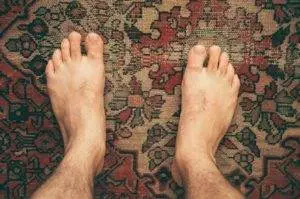
Sudden, intense pain and swelling in the big toe? Foot, ankle, knee, or elbow is red, hot, swollen and very painful? It may be a type of arthritis called gout that is caused by unusually high uric acid levels in the body. TCM methods have been used to effectively manage gout with acupuncture and herbs for thousands of years.
Gout, sometimes called gouty arthritis, is a kind of arthritis that develops over time due to other underlying conditions. When there is a sudden flare-up that creates a lot of pain and swelling in a joint, it is called an acute attack of gout. Gout is almost always related to a person’s diet and lifestyle, and part of any treatment plan is reducing intake of beverages and foods that cause gout.
Conventional treatment for gout involves first allowing the acute attack to subside, then using medications and monitoring to bring down high uric acid levels. Acupuncture and TCM have been shown in clinical studies to be even more effective at providing immediate gout pain relief and bringing down uric acid levels than typical drug therapies.
What Is Gout?
Gout is a very painful form of inflammatory arthritis caused by the buildup of uric acid crystals in a joint, often the big toe joint. Uric acid is formed as a byproduct of digestion; when the body breaks down purines–chemicals in certain foods–the resulting uric acid is processed by the kidneys and leaves the body in liquid waste. If too much uric acid is being produced, or if the kidneys are weak and unable to process it adequately, the level of uric acid in the bloodstream rises (hyperuricemia), and deposits of uric acid crystals begin to gather in the joints. These crystals have sharp edges, which are what cause the severe pain and swelling of a gout attack.
While older men are generally at higher risk for developing gout, gout can affect people of all ages and genders. Women are more likely to develop gout after menopause, when their uric acid levels tend to rise. People who are high risk for gout are those who already suffer from:
- Obesity
- Diabetes
- Heart failure
- High blood pressure
- Kidney disease
People who have a family history of gout, or who tend to eat a lot of meat and/or drink a lot of alcohol also face a higher risk for gout. Regular use of diuretics can precede attacks of gout.
The symptoms of gout can be very similar to those of other types of arthritis, but gout causes are different than those of rheumatoid arthritis. Thus is it important to seek help from your health care providers for diagnosing rheumatoid arthritis versus gout.
Top 5 Signs and Symptoms of Gout
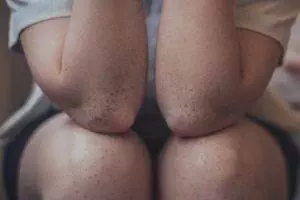
The underlying condition that causes gout is related to the kidneys, but the actual experience of gout is a form of acute inflammation, usually in one of the smaller joints of the limbs or extremities– most often there is gout in feet, especially the big toe joint. A person may have hyperuricemia for a long time, causing uric acid buildup in the body, but it doesn’t actually become “gout” until there is a flare-up of painful symptoms. The signs of a gout attack are:
- Intense pain in a joint (gout in big toe, gout in foot, gout in ankle, gout in hands, heel pain are all common)
- Redness
- Swelling
- Tenderness to even a slight touch
- Hot to the touch
Diagnostics for gouty arthritis include blood tests to check for uric acid levels, or extraction of fluids from the joint to check for uric acid crystals. Signs of gout in the joint may also show up in x-rays, or in an ultrasound or CT scan.
What is the Medical Treatment for Gout?
There are two components to conventional medical gout treatment: treatment for immediate gout pain relief, to reduce the pain and swelling of an acute attack of gout, and treatment to prevent a future gout attack by reducing the levels of uric acid in the blood.
For pain and swelling, most patients with gout are recommended NSAIDS for pain relief. People who cannot take NSAIDS due to stomach ulcers or kidney problems are often given corticosteroid injections in the affected joint. Many patients are also prescribed a drug called colchicine, which works by disrupting a specific inflammatory response in the body, which can help to reduce the formation of uric acid crystals. The rate of colchicine side effects such as nausea, vomiting, diarrhea, and stomach pain is fairly high.
To stabilize blood uric acid levels, there are medications that block the production of uric acid (Lopurin, Zyloprim, Uloric) and medications that break down and/or remove uric acid (Benemid, Zurampic, Krystexxa). These medications have to be carefully managed according to changes in uric acid formation and kidney function, as well as possible interactions with other medications. Many people who have gout also have heart problems or high blood pressure. This type of medical treatment for preventing and controlling gout often goes on for years, or even for the rest of a person’s life. Unfortunately, because it can be so difficult for both doctor and patient to keep up with monitoring, taking medication consistently, and changing dosages frequently, this sort of medical treatment often doesn’t work to prevent more gout attacks.
Can Acupuncture Help Gout?
TCM theory designates several internal pathogenic processes that can occur within the organ systems. TCM views gout as a problem of dampness and heat, and/or stagnation and buildup of phlegm in the joints. As we mentioned earlier, many, if not most, people who suffer from gout also have other health problems like hypertension or diabetes. So, the TCM provider is also looking at the root causes of those health issues and will treat those with acupuncture and herbs at the same time. The goal of acupuncture and herb supplementation is always to bring the all of the organ systems back into harmony. TCM herbs to help gout will work to strengthen the spleen, kidneys, and liver, clear heat and dampness, and improve blood circulation.
A systematic review of studies relating to TCM treatment of gout with acupuncture showed that patients receiving acupuncture and herbs fared better overall than those in the control group being given typical medical therapy. The studies measured the “resolution” of an attack of gout; meaning, whether or not the pain and swelling was completely reduced within a 24-hour period. They also measured the reduction of uric acid levels in the blood before and after treatment. According to both measures, patients who received TCM treatment for gout had better results than those taking western medicines like colchicine or allopurinol.
A controlled clinical trial conducted at a research hospital showed a 92.5% efficacy rate for treating an acute gout attack, versus an 82.5% efficacy rate for patients who were given NSAIDS to treat the pain.
Top 5 Home Remedies for Gout According to TCM

First and foremost, it is necessary to plan and follow through on an appropriate gout diet: knowing what foods to avoid with gout is vital to prevent future attacks.
- Avoid Foods that cause Gout – foods that are high in purines include red meat, organ meats, seafood and alcoholic beverages, including beer, wine, and liquors. Risk for gout rises dramatically when people drink 2-4 or more alcoholic beverages per day. This may be because the body has to prioritize processing the alcohol over removing uric acid.
- Avoid sugar – Especially sugary drinks like sodas, and sweetened juices. Fructose appears to be particularly linked to higher incidence of gout, so read labels and avoid products sweetened with fructose or high fructose corn syrup.
- Avoid refined flours and yeast – the combination of yeast, white flour, and white sugar does not provide much nutritional value, and can raise uric acid levels.
- Emphasize whole, natural foods – all fruits, vegetables, and legumes are safe to eat with gout. Eggs and low-fat dairy products are safe sources of protein.
- Drink more water – this helps your body to more effectively flush out excess uric acid.
Exercising more and working on healthy, gradual weight loss will also help to prevent future gout attacks. Your acupuncturist can help you to develop a specific gout diet that will work for your constitution.
Acupuncture Near Me for Gout
While treating gout can be tricky due to the fact that it is usually not the only health issue that needs attention, the good news is that gout is one of the few types of arthritis that can be reversed. A holistic approach that takes into consideration a person’s diet, lifestyle, and other health problems is the best way to keep the intense pain of gout at bay. Acupuncture and TCM offer a solid alternative treatment method that can relieve gout and improve your overall health, all without unwanted side effects.
*This article is for education from the perspective of Traditional Chinese Medicine only. The education provided by this article is not approved by FDA to diagnose, prevent, treat and cure human diseases. It should not stop you from consulting with your physician for your medical conditions. Traditional Chinese Medicine is based on Qi, which is an invisible force that usually cannot be observed by modern science. Because science focuses on testing ideas about the natural world with evidence obtained through observation, these aspects of acupuncture can’t be studied by science. Therefore acupuncture and Chinese herbs are often not supported by double-blind, randomized trials, and they are considered alternative medicine therapies in the United States.
How to Treat Allergy With Acupuncture and TCM
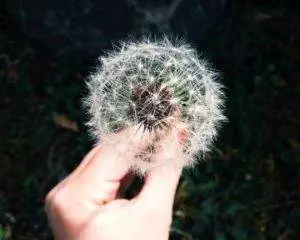
By Xiaomei Cai, L.Ac., Ph.D., & Qineng Tan, L.Ac., Ph.D.
Sinus congestion, runny nose, watery eyes? Itchy skin problem or rashes? It may be seasonal allergies, or an allergic reaction to some specific food or chemical. Acupuncture and TCM herbs can not only help to relieve allergy symptoms, but help to strengthen the body’s immune defenses, so that it is less vulnerable to allergens in the environment.
An allergy is when your immune system produces an antibody response to some substance; it could be a reaction to a plant pollen, an insect venom, a chemical in the air, or some type of food. The body is perceiving the foreign substance as a threat and manufactures antibodies to fight against it. A runny nose (rhinitis), watery eyes, itches in different parts of the head and body, and sneezing are the body’s way of trying to throw off the triggering allergens. Allergies can also cause asthma, which is when the body reacts to triggers with inflammation in the lungs and bronchial tubes, leading to coughing, wheezing, and difficulty breathing.
At least 50 million Americans experience some form of allergy symptoms every year, and the number is growing. The ever-increasing amounts of food additives, chemical pollutants, and other triggers in the environment are causing more and more people of all ages to develop allergies. TCM and Acupuncture have been recognized for a while by the WHO as helpful modalities to relieve respiratory illnesses, including seasonal allergies, rhinitis, sinusitis, and allergy-related asthma.
Top 5 Types of Allergies

Different types of allergies create a variety of symptoms. Seasonal allergies only show up at certain times of the year, when a particular pollen or other natural trigger is abundant, while chronic allergies can flare up at any time.
- Pollen Allergies – these are often referred to as “seasonal allergies,” or “hay fever,” and are triggered by natural pollens given off by trees, weeds, grass, and flowers or mold spores, pet dander. These types of allergy cause sneezing and runny nose (rhinitis) and eye allergies, or itchy, watering eyes.
- Insect Allergies – these can refer to the types of acute allergic reactions people have to bug bites (mosquito bites or spider bites) or stings from bees or wasps. It can also refer to respiratory or skin reactions to exposure to dust mites or cockroaches in the home environment.
- Skin Allergies – these include acute skin allergies like the hives or rashes caused by poison ivy or poison oak. They also include skin reactions to latex. Eczema is a more chronic skin allergy condition, where inflammation causes itchy patches of skin that can become very dry and scaly. Dermatitis or eczema often start in childhood. Flare-ups can happen due to external irritants, like certain soaps or detergents, fabrics, ingredients in topical ointments or lotions, or smoke in the air. Stress is also a contributing factor to eczema.
- Food Allergies – food allergies are especially common in children, with over 5% of children in the U.S. diagnosed in recent years. Certain types of nuts, dairy, soy, wheat, and shellfish are the most common food allergens. In some cases, food allergies are so severe that exposure can lead to a life-threatening reaction of anaphylaxis, an emergency situation in which blood pressure can slow down dramatically, and a person may have severe difficulty breathing. Every year, 200,000 people seek emergency medical care for a severe food allergy reaction.
- Drug Allergy – many people have allergic reactions to certain types of medication, including antibiotics, anti-inflammatories, ACE inhibitors, anti-seizure medications, and even aspirin. The most common symptoms of an allergic reaction to medication are: hives or rash, fever, stomach upset, or asthma-like wheezing. A severe drug allergy can also cause anaphylaxis.
Allergy treatment first involves finding out exactly what allergens will potentially cause a reaction. Allergy testing helps determine what, specifically, is triggering the symptoms. Then, a person is encouraged to avoid this trigger as best they can. Many people try over the counter antihistamines, decongestants, and nasal sprays to help manage their allergy symptoms. For more severe allergies, doctors may prescribe corticosteroids in spray, pill, or ointment formulations. Epinephrine injections are necessary to stop severe reactions and prevent anaphylactic shock.
Immunotherapy is an option for some people with a chronic allergic condition. A small amount of the allergen is introduced into the body either via injection (allergy shots) or in a sublingual (under the tongue) form. These can help people build us a better resistance to the allergy trigger over time.
How Can Acupuncture Help Seasonal Allergies?
Modern medical science has made many recent advances in understanding of the human body’s immune system. It is highly complex, and there is still much to learn. In TCM, we have for many centuries been aware of and observed what we call “Wei Qi,” which essentially means protective energy.

TCM always acknowledges dualities and the relationship between opposing and coordinating forces. In every case, we look for internal factors and external factors that are affecting the health of the person. In TCM, the immune system has both internal and external components. The external Wei Qi is a protective force that functions as a shield, blocking external pathogens like wind, dampness, and cold, from entering into the body. The lungs provide the energy to keep Wei Qi strong and especially to keep pathogens from entering through the nose and mouth. However, when Wei Qi is weak, it becomes easy for Wind to enter the head and bring with it other external pathogens, like cold, heat, dampness, or dryness.
According to TCM, a person who suffers from allergies generally has a deficiency of Wei Qi, making them more susceptible to invasions of Wind. Acupuncture treatment might focus, for example, on strengthening the lungs and spleen, which helps to build the Wei Qi back up. Herbal remedies can both relieve hay fever symptoms and rhinitis, and help to tonify the Wei Qi, so that allergic reactions will lessen over time.
One trial found that people were able to reduce their use of allergy medication after an eight-week course of acupuncture treatment for allergies. Another research study found that patients in a control group who received acupuncture reported better control of allergy symptoms during pollen season, with less reliance on antihistamines.
TCM and Acupuncture for Food Allergy
Recent research supports the efficacy of TCM herbs for helping to prevent severe reactions in people who suffer from food allergies. A specific formulation of eight Chinese herbs has been shown to be helpful for reducing the incidence of anaphylaxis in people with various types of food allergies, including milk, dairy, peanuts, tree nuts, and fruits. Herbal creams and herb bath preparations can also help prevent severe reactions, when used consistently for a course of treatment.
An acupuncture practitioner will also use their wide knowledge of nutrition to help patients with Celiac disease, food sensitivities and food intolerance manage their diet. Often, when dealing with allergies and sensitivities, it can be challenging to find what needs to be eliminated, as it is not always immediately obvious to a person which foods or other environmental factors are involved in creating the uncomfortable symptoms. Sometimes a chronic allergy is a sign of a candida infection. A TCM doctor will spend time looking carefully at all of the lifestyle behaviors involved and make appropriate recommendations to help remove hidden triggers.
Top 3 Tips to Help Allergies Naturally
Getting regular acupuncture “tune-ups” is one great, natural way to help relieve allergies. Here are some other ideas you can put into practice to help rid your home and work environment of potential allergens.
- Air Filter – a good-quality HEPA filter will remove particles of pollen, dust, and pet dander from the ambient air. This works best if you also make sure to keep the windows and doors closed when you suspect pollen is heavy in the air outside.
- Probiotics – a recent systematic review showed that taking probiotics can help reduce symptoms of allergic rhinitis. Probiotics help balance gut flora, which we now know is vital to proper immune functioning and prevention of inflammation.
- Wash Your Hands – Manage allergens that come home with you by washing your hands and putting your clothes in the laundry as soon as you get home.
Acupuncture Near Me for Allergy Relief
Seasonal allergies, food allergies, and allergies to chemicals and medication are all on the rise. While people are able to get some relief from conventional medications, TCM treatment offers a viable alternative without the possible side effects of these medicines. Acupuncture can help reduce the need for emergency treatment for severe allergic reactions, and also help prevent hay fever from recurring, year after year. Partner with an acupuncturist near me for allergy treatment now to ensure that when allergy season rolls around again, you are prepared with a strong defense.
*This article is for education from the perspective of Traditional Chinese Medicine only. The education provided by this article is not approved by FDA to diagnose, prevent, treat and cure human diseases. It should not stop you from consulting with your physician for your medical conditions. Traditional Chinese Medicine is based on Qi, which is an invisible force that usually cannot be observed by modern science. Because science focuses on testing ideas about the natural world with evidence obtained through observation, these aspects of acupuncture can’t be studied by science. Therefore acupuncture and Chinese herbs are often not supported by double-blind, randomized trials, and they are considered alternative medicine therapies in the United States.
How to Treat Asthma With Acupuncture and TCM
By Qineng Tan, L.Ac., Ph.D. & Xiaomei Cai, L.Ac., Ph.D.

Difficulty breathing? Could it be seasonal allergies, or could I have asthma? Asthma symptoms include shortness of breath, wheezing, and an allergy cough that is usually more pronounced in the morning and evening. Acupuncture and TCM have long been recognized as offering effective treatment for allergic rhinitis (hay fever) related to asthma.
Asthma, a chronic lung condition which creates inflammation of the airways of the respiratory system, often begins causing breathing problems in childhood. In fact, asthma is the most common chronic disease affecting children worldwide. Sometimes asthma symptoms go away as a child grows up, but asthma can affect both children and adults long-term.
What is an asthma attack? An asthma attack occurs when the bronchial tubes become constricted. The tightening of muscles around the bronchi, combined with inflammation on the inner walls of these airways, causes shortness of breath, chest pain, coughing, and wheezing. Asthma attacks can be profoundly frightening; sometimes people describe the experience as feeling like they’re drowning.
Allergy triggers like dust mites and ragweed often cause asthma symptoms to flare up. Asthma attacks are often triggered by the same sorts of things that cause other types of allergic reactions: high pollen counts, pet dander, chemical perfumes, or smoke. An asthma attack can also be caused by changes in temperature, strong aerobic exercise, or a bout of intense crying or laughing. A viral respiratory infection can also trigger asthma.
Asthma attacks due to seasonal allergies are often managed by conventional medicine with inhalers, corticosteroids like methylprednisolone, or antihistamines like Zyrtecs. Usually doctors will prescribe a medication intended for long-term management of symptoms, and a “rescue inhaler” designed to stop an asthma attack in progress. Allergy medications can help relieve hay fever symptoms like itchy eyes and sneezing and help prevent a full-blown asthma attack, but they do not address the immune system imbalances that are the root cause of asthma and allergies. Acupuncture treatment used in addition to standard medical remedies for asthma has been clinically shown to help reduce symptoms and improve overall quality of life. Along with helping people maintain their normal activities and sleep better, TCM methods used in conjunction with conventional medical therapy can reduce the need for trips to the emergency room or hospital for asthma attacks.
Can asthma be cured? Asthma may never go away completely, but it can be managed so effectively that it no longer has a negative impact on your life.
Top 5 Asthma Symptoms
Asthma symptoms often begin appearing during childhood, but asthma can come on at any age. When a person develops asthma later in life, it is called “adult onset asthma.” Sometimes people don’t realize they have asthma because they aren’t experiencing what they think of as the classic “asthma attack.” A persistent cough, especially one that gets worse at night, is actually one of the most pervasive symptoms of asthma. Other symptoms of asthma include:
- Coughing frequently, allergy cough
- Wheezing (that whistling sound when you breathe)
- Shortness of breath (having trouble drawing a full breath)
- Rapid breathing
- Chest tightness, breathing chest pain
Why is asthma worse at night? The precise reason for the increase of asthma symptoms during the night, known as “nocturnal asthma,” has not been medically proven, but it is probably due to a combination of factors:
- Cooler air entering the bronchial passages
- Increase of allergens like pollen in the air
- Exposure to dust mites or pet dander in the bed
- Reclining sleep position makes it harder to breathe
- Hormone secretions that occur during sleep
Nighttime asthma can really affect your ability to get enough quality sleep.
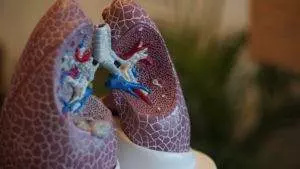
Many of the symptoms of asthma are similar to those of an allergic reaction. However, seasonal allergies usually also cause symptoms like: head congestion, runny nose, itching inside the mouth, throat, and ears, sinus pain, and postnasal drip. Asthma doesn’t cause these sorts of upper respiratory symptoms because it is a condition of the lungs and bronchial tubes.
In order to make a definitive diagnosis of asthma, a doctor will usually perform tests that determine your lung function. A spirometer is a tool that helps determine how much air you are able to inhale and exhale. If you are able to inhale better after being given medication from an inhaler, then it will be concluded that you probably have asthma. An x-ray can show whether the bronchial tubes are blocked and determine whether there might be some other cause for lung damage, such as pneumonia or tuberculosis. Often people will also be given allergy testing to determine what triggers may affect their breathing.
Can Acupuncture Help Asthma?
Asthma has been recognized by TCM since ancient times. We call asthma “Xiao Chuan,” which means “wheezing, breathlessness.” According to TCM theory, the lungs control inhaling, while the kidneys control exhaling. Lung Qi (energy) should move downward, while Liver Qi should move upward, and these energies work in harmony. Asthma is the result of one or all of these energies entering into a state of imbalance or deficiency. Excess wind and/or phlegm get trapped in the lungs and airways, creating obstructions and producing the wheezing and shortness of breath associated with asthma. Acupuncture treatment focuses largely on strengthening the kidneys and lungs, and clearing phlegm and wind from the system.
One study determined that acupuncture treatment reduced “respiratory resistance,” helping to open up the bronchial tubes. A study in Denmark focused specifically on young children with asthma showed that symptoms and need for medications was reduced significantly after ten acupuncture treatments. A systematic review of nine studies involving patients using TCM as a complementary therapy in addition to conventional treatment showed an overall improvement in asthma symptoms and concluded that acupuncture should be considered as an adjunct to medications.

As always, herbal supplementation is also a crucial component of TCM treatment for asthma and allergies. Research has shown that classic TCM herbal formulations for asthma provide many therapeutic benefits, including: reducing hyperreactivity in the bronchial tubes, reducing inflammation of the lungs and tubes, and calming muscle contractions around the airways. One study specifically focused on children with asthma concluded that patients who were given a specific TCM herb combination showed significant improvement over a 12-week period when compared to a control group of children who received a placebo instead.
Asthma attacks are genuinely frightening, and when severe, can even be life-threatening. It is important that people with asthma have emergency inhalant medications to help them in the event of a serious asthma attack. However, the regular use of steroid medications comes with other risks. Corticosteroids can suppress normal immune function, affect the adrenal hormones, and actually increase inflammation. These unwanted side effects may be especially concerning for young children with asthma. Chinese herbs offer a safe alternative to steroids, having been used for thousands of years with no negative side effects.
Top 5 Tips to Help Control Asthma
It’s important to seek health care for managing asthma, but there are home remedies for shortness of breath and natural remedies for wheezing that may help you take control of asthma attacks and help you sleep better without an asthma coughing attack in the night.
- Don’t smoke, and avoid other people who do. Stay out of places where there is second-hand cigarette smoke or other ambient smoke or chemical perfumes.
- Use a high quality air filter in your home. Keep dust and mold under control. Remove old carpets and any other fabrics that might have dust mites in them.
- Manage stress. Stress and anxiety can be triggers for asthma attacks. Regular acupuncture treatment will help, as will consistent practice of meditation and breathing exercises.
- Avoid dairy products. Milk and other dairy foods are notorious for creating congestion and irritating the airways.
- Drink warm, soothing liquids throughout the day. Tea and warm honey-lemon water keep the airways moist and open, while providing immune-boosting properties.
Acupuncture Near Me for Asthma
The benefits of acupuncture treatment are cumulative. Building a strong and consistent partnership with a TCM provider can help you to manage asthma and allergy symptoms, boost your overall immunity, and prevent other health problems from developing. If you or someone you know has breathing problems, allergies, or food sensitivities, call Art of Wellness today to get started with a wellness regimen that will have you breathing easier.
*This article is for education from the perspective of Traditional Chinese Medicine only. The education provided by this article is not approved by FDA to diagnose, prevent, treat and cure human diseases. It should not stop you from consulting with your physician for your medical conditions. Traditional Chinese Medicine is based on Qi, which is an invisible force that usually cannot be observed by modern science. Because science focuses on testing ideas about the natural world with evidence obtained through observation, these aspects of acupuncture can’t be studied by science. Therefore acupuncture and Chinese herbs are often not supported by double-blind, randomized trials, and they are considered alternative medicine therapies in the United States.